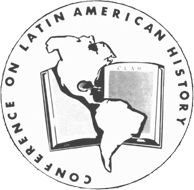TEACHING AND TEACHING MATERIALS STUDIES COMMITTEE: “1973/2013: Chileanists Teach September 11th at 40”
TEACHING AND TEACHING MATERIALS STUDIES COMMITTEE
January 4, 2013, 7:00-8:30 p.m. Hotel Monteleone, New Orleans, LA “1973/2013: Chileanists Teach September 11th at 40”
Chair: Chad Black, University of Tennessee, Knoxville
Two of the scheduled panelists could not attend. Therefore, the panel consisted of Steven Volk (Oberlin College), Alison Bruey (University of North Florida), and Brenda Elsey (Hofstra University). Chair of the committee, Chad Black, opened by outlining the importance of the Allende period and subsequent coup in Latin American historiography.
Alison Bruey explained the different approaches to teaching about 9/11/1973 in different level courses. She typically begins with the Frei administration, moving on to the UP elections and poder popular, and then onto the coup. Professor Bruey has found that students often equate Communism and dictatorship. Thus, the Pinochet regime presents an opportunity to discuss different forms of capitalism, authoritarianism, and democracy. She has found the Killing Zone and Victims of the Miracle particularly useful in teaching the transition from the Cold War to Neoliberalism in Chile.
Steven Volk explained that his courses begin with the history of the Left and labor movements in Chile from the early twentieth century and forward. He has noted that by framing the 9/11 coup in the context of the Cold War, his students can give undue causal power to the United States’ interference. Professor Volk draws upon his own history to provide students with an understanding of the historical moment in Chile. He was in Santiago during and after the coup, and remained involved in solidarity efforts for decades following the overthrow of Allende. Professor Volk described an avatar project he uses in his comparative course on Dirty Wars and Democracy. Students select pieces of paper with parameters (birthdate, gender, religion) of a person living in either Chile or Argentina. They proceed through the time period and construct how such a person experienced the coup and its aftermath. Volk also ties 9/11 with more contemporary issues of state terror.
Brenda Elsey has found students need to understand the longer historical trajectory of Chilean politics to grasp the importance of the coup. She begins with the development of a multi-party system during the early twentieth century. Professor Elsey finds that developing empathy for victims of the Dirty Wars to be a key starting point in teaching the coup. Her courses spend significant time explaining the distinct visions of the UP and opposition parties. In terms of the U.S involvement, she has created a primary source analysis assignment for students to research documents from the C.I.A.’s own Chile Declassification Project. She also uses the photographic collection of Marcelo Montecinos, the arpilleras chapter in the Americas text, testimonies from the Valech commission, and the Battle of Chile. In addition, she has found Ken Loach’s short film 9/11, which features a Chilean exile’s open letter to the U.S. after 9/11/01 to be a good introduction to the topic.
The audience provided wonderful suggestions and discussion of teaching methods, materials, and objectives around the Chilean 9/11. The audience and panel compared different experiences with students depending on their class, region, and age cohort. Peter Winn pointed out the importance of discussing state and non-state terrorism in the context of Chile’s 9/11. He also mentioned success with using Fear at the Edge. Finally, the Chile Reader, a compendium of primary documents will be published in the coming year.
Other audience members, including Professor Tracy Jaffe, remarked that they found a discussion of the Cuban Revolution essential to helping students understand the overthrow of Allende. Many suggestions for materials included archives from the Museo de la Memoria, Margaret Power’s Right Wing Women, 4 Days in September, Machuca, Memoria Obstinada, Motorcycle Diaries, and Peter Winn’s Weavers of the Revolution.
Notes submitted by:
Secretary, Brenda Elsey (Hofstra University), 1/18/2013
